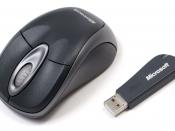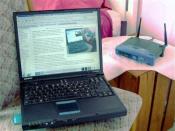Abstract
Wireless technology can provide many benefits to computing including faster response to queries, reduced time spent on paperwork, increased online time for users, just-in-time and real time control, tighter communications between clients and hosts. Wireless Computing is governed by two general forces: Technology, which provides a set of basic building blocks and User Applications, which determine a set of operations that must be carried out efficiently on demand. This paper summarizes
technological changes that are underway and describes their impact on wireless computing development and implementation. It also describes the applications that influence the development and implementation of wireless computing and shows what current systems offer.
Introduction:
Wireless computing is the topic of much conversation today. The concept has been around for some time now but has been mainly utilizing communication protocols that exist for voice based communication. It is not intended to replace wired data communication but instead to be utilized in areas that it would be otherwise impossible to communicate using wires.
Only recently has the industry
been taking steps to formulate a standard that is more suitable to data transmission. Some the problems to be overcome are:
(1) Data Integrity - relatively error free transmission,
(2) Speed - as close as possible to the speed of current wired networks,
(3) Protection - making sure that the data now airborne is encoded and cannot be tapped by unwelcome receivers,
(4) Compatibility - ensuring that the many protocols that sure to be created subscribe to a standard to allow inter-operability,
(5) Environmentally safe - strengths of electromagnetic radiation must be kept within normal levels. In our study of the theories and implementation concerns of wireless computing, we found that it is being treated in an object oriented fashion. Scientists and development crews, including the IEEE, are doing their...



Good Essay
Good essay, offers a lot of information on wireless standards and provides insight and specific examples of wireless technology available at the time the essay was written.
3 out of 3 people found this comment useful.